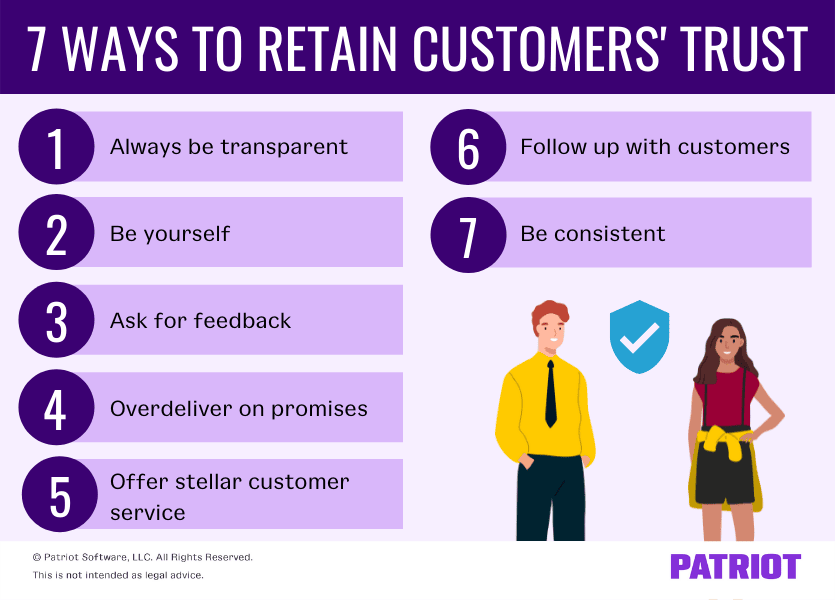In business, trust isn’t something you can build overnight. It takes time and energy to build up said trust with customers. And, it takes even more effort to retain it. If you want to keep your customers for the long haul, keep a few strategies to retain customers’ trust up your sleeve.
Strategies to retain customers’ trust
Customer retention equals satisfied customers. And with satisfied customers come valuable feedback, a boost in your bottom line, and business relationships that last a lifetime. To keep your customers loyal and coming back for more, utilize these seven ways to retain customers’ trust.

1. Always be transparent
When it comes to attracting and retaining customers for the long haul, there’s one key ingredient: transparency.
Consumers want transparency. In fact, some need it from a business to commit to the brand. Nine out of 10 consumers will stop purchasing from brands that lack transparency.
Needless to say, you shouldn’t be shying away from transparency. So, how can you show your current (and potential) customers that your brand is transparent? Give these tactics a shot:
- Be open and honest about everything (e.g., pricing, changes to products, etc.)
- Showcase your business’s core values
- Keep employees in the loop
- Respond to customers’ questions and issues
- Own up to mistakes and learn from them
- Prioritize communication
- Encourage feedback from everyone
Be crystal clear with everyone involved in your business. This means both your customers and your team. The more you do to be transparent, the better off your business will be.
On the importance of transparency in business, Mike Grossman, CEO of GoodHire, said:
Customers respect transparency. If you happen to make a mistake, don’t push it under the rug in an effort to seem perfect. Instead, own up to it and take responsibility. Honesty is humanizing, and in a sea of faceless corporate brands, it makes customers feel more at ease doing business with you. By taking accountability for the good and the bad, it becomes far easier to retain the trust of your customers.
2. Be yourself
You didn’t start your business to try to be someone else. You started it because you wanted to stand out in the market and be unique. And if you want to build trust, you have to be yourself.
Pretending to be someone you’re not can only hurt your business. Customers don’t want to buy from someone they think is fake. They want to support a business that’s genuine and one that they can relate to.
Show who you are by letting customers get to know you and showcasing your personality. Let your personality shine on your business website, social media pages, marketing copy, and more.
Don’t be afraid to be yourself in business. Chances are, your customers will appreciate it. And in turn, you can retain their trust for a lifetime.
3. Ask for feedback (and listen to it)
Feedback is oh-so-important in the business sphere. Without it, you won’t know what you’re doing right and what you’re doing wrong. And therefore, you can never make improvements or work with your strengths. Not to mention, if you aren’t listening to your customers’ feedback, they may stop trusting your business altogether.
To show customers you care about their opinions and want to make your business the best it can be for them, ask for feedback—and actually listen to it. You can collect feedback by:
- Sending out email surveys
- Asking customers questions in person (e.g., How was your meal?)
- Having customers fill out questionnaires (on paper or online)
- Using social media polls
- Requesting that customers leave you a review (e.g., on Trustpilot)
Want to impress your friends at a dinner party?
Get the latest small business news delivered straight to your inbox.
4. Overdeliver on promises
Chances are, you’ve made a promise or two to your customers before. Maybe you’ve said you will promise to provide quick services. Or, maybe you promised to only use the freshest ingredients in your food. Whatever the case may be, you need to be true to your promises and overdeliver on them.
Sure, promises sound like a great idea when you’re coming up with your mission statement, adding copy to your website, and marketing your offerings. But if you can’t actually deliver on your promises, you can quickly lose customers’ trust.
To keep your promises and your customers satisfied, overdeliver on your promises and ensure your business is actually following through with them. And, don’t make promises you can’t keep. If you make a mistake, own up to it and go above and beyond to make sure you fix it for the customer.
5. Offer stellar customer service
According to a Microsoft study, a whopping 90% of consumers use customer service as a deciding factor for whether or not to do business with a company.
It’s no secret that offering excellent customer service can make or break whether a customer trusts your company. But all too often, businesses bypass prioritizing customer service.
To ensure your business’s customer service is top-notch, you can:
- Improve how you train employees
- Expand your communication options (e.g., phone, email, etc.)
- Utilize customer service tools (e.g., online chat)
- Measure and analyze customer feedback
6. Follow up with customers
How often do you keep in touch with your customers? Once every few days? Every couple of weeks? Never? If you fail to keep in touch with customers, they could wind up forgetting about you, and you could miss out on establishing long-term relationships.
Regardless if a customer has had an issue or not, you should follow up with them to ensure you’re meeting their needs. Not only can it help build trust because your customers see that you care about their feedback and business, but following up can help prevent other issues later on.
Consider following up with a quick phone call or email. A little bit of follow up effort can go a long way in building trust and retaining customers.
7. Be consistent
Like with a lot of things in life, consistency is key in business—especially when you’re trying to build trust with customers.
When you are a consistent company that follows through and customers can count on you, you gain trust. You should be consistent when it comes to your offerings, promises, customer service, etc. The list goes on and on.
If you’re not consistent (e.g., customer service is starting to lack), your customers will begin to lose faith in you. And when they lose trust, they may decide to move on to someone who can provide the consistency they want and need.
So, make sure you’re consistent in every aspect of your business. If there’s something that needs improvement, make adjustments. And if there’s something you’re consistently good at already, make sure it’s the same if not better than ever before.
This is not intended as legal advice; for more information, please click here.



